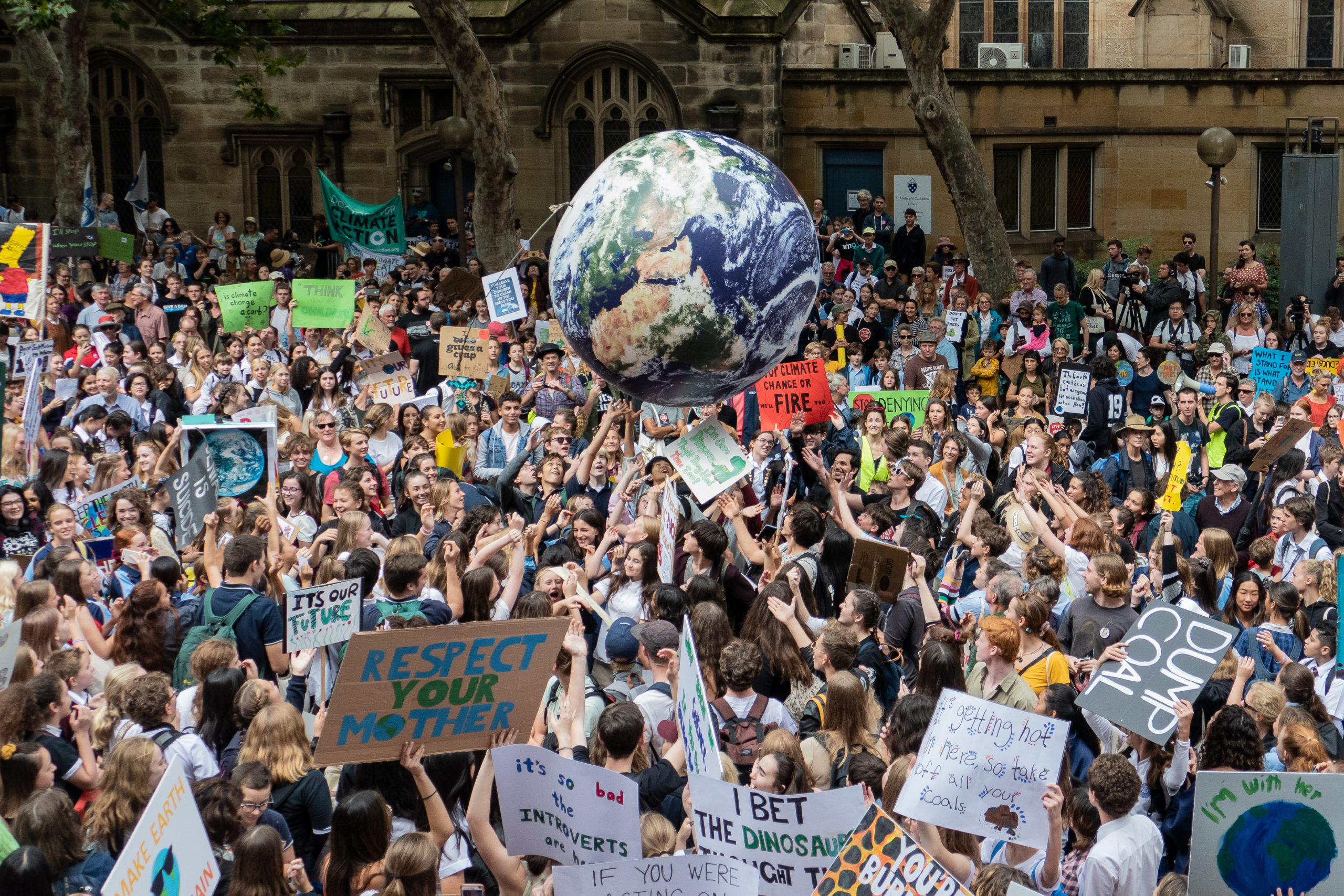 Poonam Joshi
Poonam Joshi
News & Resources
Members of the 10,000 strong Gulabi Gang march through Banda, India (Source: Sanjit Das / Panos)

28 Jan 2022
How can we defend and expand civic space?
People organising in on and offline civic spaces have been integral to almost every progressive political and social change – from ending slavery and securing the vote, to setting up trade unions, achieving decolonisation, pushing for LGBTQI+ equality and spreading critical knowledge and understanding about the climate crisis.
More than ever, humanity needs this precious space in which to organise if we are to deal with the existential crises we now face: irreversible climate change, declining trust in government and democracy, and the social, economic and health inequalities most lately exposed by the Covid pandemic.
But there has been an unprecedented attack on civic space over the last twenty years, leaving our engine room of change unsafe and shrinking for many communities. In the aftermath of 9/11, governments all over the world gifted themselves unprecedented new powers, and have used a security-justifies-almost-anything narrative to chip away at the rights to freedom of assembly, association and expression – often blatantly using these powers to curtail their opponents. Far right agitators outside of government amplify the fear-based narratives that sustain permission for these policies, and have created a hostile atmosphere in on and offline civic spaces for social justice movements, including those working on women’s rights, LGBTQI+ equality and anti-racism. Big business has both acquiesced in this repression, providing the technologies for the surveillance and harassment of human rights groups, and has confidently attacked the environment, land and indigenous activists who threaten its interests, knowing that governments will not hold them to account.
What are the drivers of this repression?
FICS’ 2020 investigation of how and why civic space was shrinking, Rethinking Civic Space, is based on interviews with more than 150 civil society representatives from all over the world, working across the environment and land rights, social inequalities, democracy and human rights. Those interviewed reported increasing repression whatever organising tactics they adopted – protest prohibited, funding obstructed, online spaces moderated and censored, key activists subject to travel bans, and for some, eventually, physical attacks and imprisonment.
As FICS tracked these experiences in very different settings, we produced a new and landmark analysis which sets out the drivers of this persecution and not just its symptoms. We found these principal drivers of shrinking civic space to be:
- The abuse of counter-terrorism laws and policies by governments, according to a concerted transnational agenda;
- The growth of populist anti-rights social and political movements, who weaponize fear and scarcity narratives to build their power;
- The concentrating of economic power in the hands of large multinational companies and the super wealthy, who have enormous influence over governments but who are not accountable to the societies in which they operate.
These drivers are intertwined. While governments pass draconian new counter-terrorism laws, far right agitators amplify the fear and hate narratives that cast minority communities as likely terrorists, and companies profit from the increased surveillance, policing and hate. Anti-rights groups and their funders help dangerous anti-democratic populists win elections, and keep people fixated on ‘nation’ and ‘tradition’, and attention diverted from health and economic inequalities and the enormous wealth accumulation by companies and corrupt governments.
What strategies are needed to counter the attack on civic space?
Because these drivers of shrinking civic space are complex and intertwined, a range of strategies is needed to push them back. It needs deep connections between people and groups working at every level as allies – from grassroots movements to the transnational advocacy level, backed by funders who can commit to long-term support and taking some risks.
FICS recommends:
A multi-pronged pushback against ‘the security playbook’
FICS has identified a ’security playbook’ deployed by governments to push through and justify draconian counter-terrorism approaches. Governments pass laws which criminalise and disrupt human rights work; they use technologies including surveillance against those they deem a threat; and then they pump out fear-based narratives to justify all of this. In challenging this dominant practical driver of shrinking civic space, we need to hold a mirror up to the circular arguments in this ‘security playbook’ and expose its wholly disproportionate impact on human rights. Progressives need to be supported to hold to account those who promote this agenda at home and internationally, and then use every means of pushing back, including advocacy and campaigns, litigation in local and international courts, movement building, shifting public opinion and advocating for alternatives to the status quo that respect human rights and protect civic freedoms.
Dedicated resource for building visions of alternative futures and inclusive communities
We need a different kind of work to disrupt the far and religious right populists who made such headway and helped win elections over the last decade. Progressive social movements need the time and space to build transformative visions of caring and inclusive communities, which can rival the frightening hate and scarcity narratives of the reactionaries. We have a better and more caring and hopeful story to tell about families and the wider community, but support is needed to build this up and get it on the agenda. Networks and networking are vital.
Hold economic interests to account
Herculean work is required to rein in out-of-control economic interests, who are both hoarding resources and exerting undue influence on governments and undermining democracy. There are already a wide array of communities whose very survival depends on resistance, and researchers and advocates working with them. Because this area includes power and control over so much civic space, from our digital rights to surveillance and freedom of movement in physical space, it is a key area for sharp future-casting and doing the visioning work on what we will need to keep civic space open in the decades to come. This includes establishing law and norms around the recognition of online space as a public good which companies steward on trust.
What is the role of the funding community?
The key message for this critical decade is that all of us in the human rights and civic space funding community need to be braver and more ambitious in what we aim to address. Alongside channelling in critical funding to ‘hotspots’ when activists are already being harassed and persecuted, we need to be committed to tackling the upstream drivers of shrinking civic space. This will involve major collaboration between funders, taking risks, being willing to underwrite the testing of new approaches and new partnerships, and advocating for the critical value of civic space among funder peers who work on social justice.
At FICS our aim is to keep scanning the horizon and providing up to date analysis and an account of the trends driving the phenomenon of shrinking civic space wherever possible. We are connected to those on the frontline on every continent, and to those who are monitoring and developing innovative advocacy tactics at national and international levels. We have launched Civic Futures with The Fund for Global Human Rights to challenge the pernicious impacts of counter-terrorism policies on activists and civic space, and we hope others will join us. And, together with activists from a range of movements, we are incubating a new, global network to counter narratives that spread fear and division. We make grants to those in a position to hold to account attacks on civic space, and we commission and publish research which describes and analyses the trends in shrinking civic space.
No funder, whatever their size, can master and resource this key problem alone. FICS exists to make the case for major collaboration on protecting civic space among our funding peers, and to provide the tools, analysis and connections which might make a difference.
Keeping civic space open is the key underlying issue of our time; it will determine whether action on every other urgent social and environmental crisis is enabled or prevented.
We have seen governments seize every opportunity, from terrorism to Covid, to crackdown on hard won rights and freedoms, and we have seen populists and economic interests acquiesce in this. But a determined collaboration between progressive social movements, activists, allies and funders can change this. Get in touch if you want to be part of it.

20 May 2020 -
Report
Authors Ben Hayes and Poonam Joshi summarise the key findings of the FICS 2019 strategic review, which sought ...

25 Mar 2021 -
News
Security laws and policies have severely squeezed civic space over the last two decades.